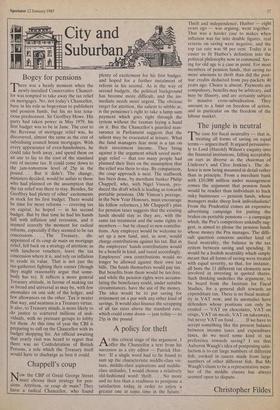A policy for theft
At this critical stage of the argument, I offer the Chancellor a text from his successor as a city editor — Patrick Hut- ber: 'If a single word had to be found to sum up the characteristic middle-class vir- tues, middle-class aspirations and middle- class attitudes, I would choose a relatively old-fashioned word: thrift. . . . No more and no less than a readiness to postpone a satisfaction today in order to enjoy a greater one at some time in the future.' Thrift and independence, Hutber — eight years ago — was arguing, went together. That was a harder case to makes when inflation was far into double figures, real returns on saving were negative, and the top tax rate was 98 per cent. Today it is easier to fit Hutber's definition into the political philosophy now in command. Sav- ing for old age is a case in point. For most members of pension funds, that saving no more amounts to thrift than did the post- war credits deducted from pay-packets 40 years ago. Choice is absent. Payments are compulsory, benefits may be arbitrary, and may be illusory, and are certainly subject to massive cross-subsidisation. They amount to a limit on freedom of action, and in particular on the freedom of the labour market.






































 Previous page
Previous page